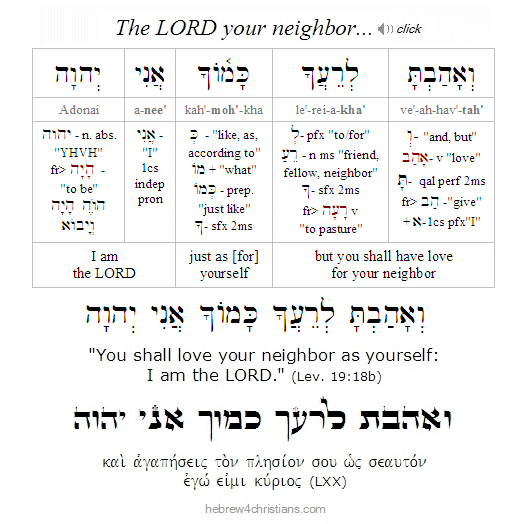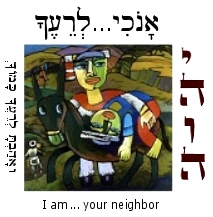|
In response to the death of Aaron's sons for offering "strange fire" in the Tabernacle, Acharei Mot ("after the death") explains the holiness code for the kohanim (priests) of Israel -- and in particular gives the laws for the Yom Kippur service. The following Torah portion, parashat Kedoshim, concerns the holiness code for the entire congregation of Israel.
In Hebrew, the word "holiness" is kedushah (קְדֻשָׁה), from a root (קדשׁ) that means sanctity or "set-apartness." Other Hebrew words that use this root include kadosh (קָדוֹשׁ, 'holy'), kiddush (קִדּוּש, sanctifying the wine), kaddish (קַדִּישׁ, sanctifying the Name), kiddushin (the ring ceremony at a marriage), mikdash (מִקְדָּש, sanctuary), and so on. Kadosh connotes the sphere of the sacred that is radically separate from all that is sinful and profane. As such, it is lofty and elevated (Isa. 57:15), beyond all comparison and utterly unique (Isa. 40:25), entirely righteous (Isa. 5:16), glorious and awesome (Psalm 99:3), full of light and power (Isa. 10:7), and is chosen and favored as God's own (Ezek. 22:26). Indeed, holiness is a synonym for the LORD Himself (HaKadosh barukh hu - The Holy One, blessed be He).
The idea of the holy (kadosh) therefore implies differentiation: the realm of the holy is entirely set apart from the common, the habitual, or the profane. The holy is singular, awe-inspiring, even "terrible" or dreadful (see Neh. 1:5; Psalm 68:35). As the Holy One (hakadosh), God is utterly unique, distinct, sacred, and "set apart" as the only One of its kind. He alone is worthy of true worship and adoration, since He alone is peerless, without rival, and stands in relation to the world as Creator and Lord. Yes, only the Lord is infinitely and eternally Other -- known to Himself as "I AM THAT I AM" (Exod. 3:15).
Holiness, then, implies more than an abstract or indifferent "metaphysical" separation (as is suggested by various forms of dualism), but rather separation from that which is mundane (chullin), banal, common, or evil. In other words, holiness implies absolute moral goodness and perfection. It is impossible that the Holy One could condone sin, since this would negate the distinction between the sacred and profane and thereby undermine the nature of holiness itself. The Holy is in opposition to the profane and therefore the LORD must hate and oppose that which violates the sacred.
Various practical mitzvot are given in this Torah portion through which a Jew is sanctified, or set apart to be kadosh - holy - and therefore fit for relationship with God. God is not only "wholly Other" (i.e., transcendent) but also pervades all of creation (i.e., "immanent"), and those who are called into His Presence must therefore be holy themselves. Such practical holiness results in sanctification obtained through the observance of commandments (mitzvot). These commandments include both mitzvot aseh (commandments to do something) and mitzvot lo ta'aseh (commandments to refrain from doing something). In addition, chukkim, or "statutes" are given that further separate the Jew from the customs and profanity of the surrounding nations.
For example, though it is inevitable (and psychologically necessary) that we make judgments about other people, the Torah states, b'tzedek tishpot 'amitekha, "in righteousness shall you judge your neighbor" (see also John 7:24), which implies that we must be forgiving and good when we think of other people.
The focal point and the very heart of what practical holiness means is stated as the duty: ve'ahavta le're'akha kamokha (וְאָהַבְתָּ לְרֵעֲךָ כָּמוֹךָ) - "You shall love your neighbor as yourself" (Lev. 19:18). Note that the direct object of the verb (i.e., ahav - to love) is your "neighbor" (רֵעַ). But who, exactly, is your neighbor? Some have claimed that the word re'a (neighbor) refers only to one's fellow Jew or friend, and not to others at large in the world. However this is certainly false, since the "stranger" (ger) is explicitly identified to be an object of our love (see Lev. 19:34). And note that when Yeshua was asked this very question, he turned it around. Instead of attempting to find someone worthy of neighborly love, we are asked to be worthy and loving neighbors ourselves (Luke 10:29-37).
וְאָהַבְתָּ לְרֵעֲךָ כָּמוֹךָ אֲנִי יְהוָה
ve·a·hav·ta · le·rei·a·kha · ka·mo'·kha · a·nee · Adonai

"You shall love your neighbor as yourself:
I am the LORD." (Lev. 19:18b)
Download Study Card


In this connection, it is interesting to note that the gematria for the Hebrew commandment, "You shall love your neighbor as yourself" (i.e., וְאָהַבְתָּ לְרֵעֲךָ כָּמוֹך) equals 820, the same value as the word yekidashti (וְקִדַּשְׁתִּי), "And I [the LORD] will sanctify" (Exod. 29:44). When God commands us to "love your neighbor as yourself," he graciously includes the addendum: "I am the LORD," which the sages understood to mean, "I will help you to do this," or (in this case) "I will sanctify you through your acts of lovingkindness."
Love is the central idea of all true Torah. Though there are some slight language differences between the Exodus and Deuteronomy versions of the Ten Commandments, both begin with "I AM" (אָנכִי) and both end with "[for] your neighbor" (לְרֵעֶךָ). Joining these together says "I am your neighbor," indicating that the LORD Himself is found in your neighbor. When we love our neighbor as ourselves (אָהַבְתָּ לְרֵעֲךָ כָּמוֹךָ), we are in effect demonstrating our love for the LORD. We must learn to disregard the claims of our ego and cling to the idea of chesed. So who is your neighbor? You are -- to every other soul you may encounter this day.
Though most sages say that the greatest principle of Torah is to love your neighbor as yourself, Ben Azzai said that even greater is believing that God created human beings in His likeness (בִּדְמוּת), since then one cannot say, "Since I despise myself I can despise another as well; since I curse myself, let the other be accursed as well." Being made in God's likeness implies that how we regard ourselves and others is the same measure we regard God Himself (1 John 4:20). Therefore the first commandment is always, "I am the LORD thy God..." (Exod. 20:2), since apart from faith, there is no Torah of any kind.
In general, the phrase ve'ahavta le're'akha kamokha is considered the most comprehensive rule of conduct toward others found in the entire Torah. Thus Hillel, a contemporary of the Yeshua, commented regarding this phrase: "That which is hateful to you, do not do to your neighbor. That is the whole Torah; the rest is commentary." Yeshua likewise said "all things whatsoever ye would that men should do to you, do ye even so to them: for this is the law and the prophets" (Matt 7:12). The apostle Paul also wrote "Love worketh no ill to his neighbor: therefore love is the fulfilling of the law" (see Rom. 13:10, Gal. 5:14).
The mystery of holiness is that it is bound up in true love...
<< Return
|




